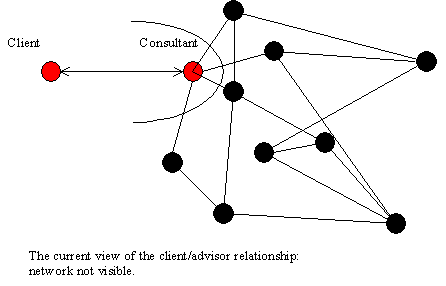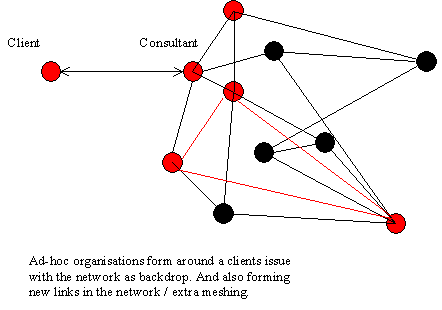Summary: In my prior entry on Justice I quoted from John Rawls‘ A Theory of Justice. That entry was to be the first in a three entry series, each entry dealing with some facet of thinking about social (or distributive) justice. In this entry I discuss Peter Corning‘s principle of Fair Shares. While Rawls‘ theory is principled it is drawn from a self-feeding theory of “right action” (not necessarily his terminology), Corning‘s is justified in terms of Systems Theory as it can be applied to human suprasystems as they are empirically understood to operate.
After analyzing the biological and evolutionary bases for group-supportive behavior, and buttressing these insights with observations by Plato and Aristotle, amongst a large number of others--including primate psychologists and human sociologists, he presents his Fair Shares approach. The fair shares approach, he explains,
- takes care of basic survival needs,
- recognizes meritorious behavior beyond survival and
- requires, in return, that each individual contribute to the human suprasystem‘s survival and success.
The philosopher John Rawls, in his celebrated (and much debated) theory of “justice as fairness,” arrived at a similar place, albeit by a different route. He too tried to wrestle with the undeniable fact of inequalities coupled with the existential needs of the least advantaged. But Rawls did strike a chord, whatever the flaws in his fingering, with a broad spectrum of the “fair minded” -- those who seek a “middle-way” between the revolutionary agenda of radical egalitarian socialists and the failed promise of “natural justice” purveyed by the laissez faire capitalists (or worse, the sanguinary “survival of the fittest” ethics of the Social Darwinists). There is a middle-way, and it has a biological foundation.
Fair Shares: A Synopsis
Two distinct and frequently competing moral claims arise out of the imperatives of human nature and the nature of human society as a collective survival enterprise: (1)basic needs (or distributive equity) and (2) “merit” (giving every man his/her due). In the fair shares paradigm, our basic survival needs take precedence, but they do not nullify the claim to merit; they impose a constraint. The middle-ground position recognizes the validity of both capitalist and socialist/liberal moral claims. Accordingly, the fair shares framework rests on two major principles.
- Goods and services should be distributed to each according to his/her basic needs. This may sound like an echo of Karl Marx, but it is at once more specific and more limited. Here the term "basic needs" refers to the 14 primary needs* domains [that will be explained below]. Our basic needs are not a vague, open-ended abstraction, or a matter of personal preference. They constitute a concrete agenda, albeit subject to further refinement, with measurable indicators for assessing the outcomes. Also, this paradigm fully recognizes the fact that there are individual and contextual differences and vitally important instrumental needs (which are also subject to change throughout the life-cycle) and that reproduction and the needs of dependent offspring must be included as well. It should go without saying that both the market place and a variety of other forms of collective action (inclusive of government action) have a vital role to play in meeting our basic needs.
- Surpluses beyond the provision for our basic needs should be distributed according to "merit" . Merit has many facets, of course, but the ultimate criterion is rewards that are proportionate to the contributions that are made to the collective survival enterprise, and to our collective needs (the public interest).This would obviously exclude the profits of drug lords, for example, as well as excessive profits due to various market distortions, like monopoly and cartel pricing, insider information, fraud, and so forth. However, there is no formulaic way of determining merit. Both the market place and a representative, mixed, democratic government, not to mention an independent judiciary and many other social mechanisms, can (and do) play a vital role in the imperfect art of determning what is fair compensation. The "merit" principle merely stakes a moral claim and poses the right question
"Does the paradigm imply a return to "welfare queens," or a culture of "free-loading" and an indolent class of economic "defectors" (in game theory terminology)? The answer is emphatically no. Where's the equity in that? In fact, a crucial corallary of these two principles is that the collective survival enterprise has always been based on"mutalism" and "reciprocity", with "altruism" being limited to special circumstances under a distinct moral claim (primarily aid for what would be called "no-fault needs"). So a third principle must be added to the fair shares paradigm, namely:
- In return, each of us is obliged to contribute to the collective survival enterprise in accordance with his/her ability . Needless to say, this principle applies to the rich and the poor, to welfare mothers and wealthy matrons. However, it also begs the question. How are "abilities" and "contributions" to be determined? Again, there are no formulaic answers, but societies have developed various ways for permitting such collective judgements to be made, from markets to legislatures, election processes, "random" military drafts, examinations, licenses, performance evaluations and many more. One of the anonymous reviewers for this article characterized this paradigm as "fuzzy Marxism." In fact, the opposite is true. Marxism is grounded in fuzzy biology, along with a simplistic and one-sided model of human nature. Marxism actually violates the fair shares princples. For one thing, Marx was quite vague about specifying what our basic needs are. He allowed the inference to be made that equality and equity are equivalent. Second, Marx made no provision at all for "merit", and he was quite hostile toward capitalists. Remember? Capitalists were viewed as the villains and were destined, in accordance with the dynamic of Marx's dialectical materialism, to end up in "the dustbin of history" (to borrow Bolshevik Leon Trotsky's epitaph for the Mensheviks). But most important, Marx's directive that everyone should contribute in accordance with their ability, absent the other two fair shares principles articulated above (especially the claim for merit), could be viewed as potentially exploitive and unjust. Despite the similariities in phrasing, the Marxian "contribution principle" does not accord with the fair shares paradigm. (*All quoted material from Corning, Peter A. , In Press, Fair Shares: Beyond Capitalism and Socialism. The Biological Basis of Social Justice, in "Politics and the Life Sciences")(Click here for a pdf copy of the document).
**Haven't surfaced the entire list of needs, however 12 of the 14 are probably:
- Nutrition
- Mental Health
- Reproduction
- Child Nurturance
- Adequate Shelter
- Sufficient Income
- Thermoregulation
- Mobility
- Fresh water supplies
- Sanitation/waste elimination
- Respiration
- Physical Safety
**From Corning, Peter A.(2000) "Biological Adaptation in Human Societies: A 'Basic Needs' Approach" in Journal of Bioeconomics, 2:41-86
In short, and to oversimplify, the philosophical/ethical arguments for social justice my well be about behaviors that are also wired into individuals and the "superorganisms" of which they must seek to be a part. Corning argues that the fair shares notion of justice is not only "nice" but will be accepted, because a) supporting solidarity and 'the collective survival enterprise' is ultimately self-serving, b)if the powerful "excessively" concentrate benefits in their own hands and put risks and harms on the backs of the powerless the probability of losing power increases considerably and c) because [it has been empirically demonstrated that] under a relatively broad set of social and political conditions people are innately willing to scrutinize and support the fairness enterprise...in their own behavior and in that of others.
Can we apply broad principles of social justice to families, to businesses? I think the answer is "Yes!" In our families, our schools, our businesses we would want these principles to obtain: all have survival needs taken care of; if there are excess resources after survival of all has been taken care of, then distribute the excess in proportion to the quality of individual contribution; finally, expect that each member invests significantly in the general survival needs of the supraorganiism (whether family, business, school, state, or nation).







